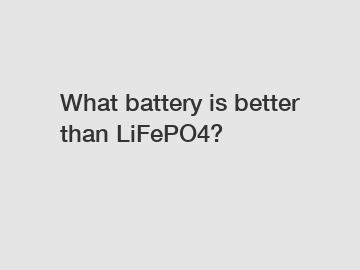What battery is better than LiFePO4?
What battery is better than LiFePO4?
In recent years, lithium iron phosphate (LiFePO4) batteries have gained popularity for their reliability, safety, and long lifespan. These batteries have become the preferred choice for various applications, including electric vehicles, renewable energy storage, and portable devices. However, advancements in battery technology are constantly being made, and there are other battery alternatives that offer unique advantages over LiFePO4. In this article, we will explore some of these alternatives and their potential benefits.
1. Lithium-ion (Li-ion) Batteries:

Li-ion batteries are widely used in consumer electronics and have a high energy density, making them a favorable option for portable devices. Compared to LiFePO4 batteries, Li-ion batteries offer a higher capacity, allowing for longer operating times. Additionally, Li-ion batteries have a lower self-discharge rate, which means they can hold their charge for a longer period when not in use. However, Li-ion batteries are typically more expensive and have a shorter lifespan compared to LiFePO4 batteries.
2. Nickel Cadmium (NiCd) Batteries:
NiCd batteries have been around for decades and are known for their durability and the ability to withstand extreme temperatures. They offer a long cycle life and excellent performance in cold environments, making them suitable for outdoor applications and industries like aviation and telecommunication. However, NiCd batteries contain toxic materials like cadmium, which can be harmful to the environment if not properly disposed of. This has led to a decline in their usage and the emergence of more environmentally friendly alternatives.
3. Nickel-Metal Hydride (NiMH) Batteries:
NiMH batteries are an improvement over NiCd batteries and offer a higher energy density. They are commonly used in hybrid vehicles and portable electronic devices. NiMH batteries are more environmentally friendly than NiCd batteries as they do not contain toxic materials. However, their energy density is lower compared to LiFePO4 batteries, resulting in a shorter operating time. They also have a higher self-discharge rate, leading to faster loss of charge when not in use.
4. Solid-State Batteries:
Solid-state batteries are an emerging technology that aims to address some of the limitations of traditional lithium-ion batteries. These batteries use solid electrolytes instead of liquid ones, which makes them safer and less likely to catch fire. They also offer higher energy density, longer lifespan, and faster charging times compared to LiFePO4 batteries. However, solid-state batteries are still in the early stages of development and are not yet commercially available in large quantities.
While these alternatives have their own advantages, it is important to consider the specific requirements of each application before deciding on the most suitable battery technology. Factors such as energy density, lifespan, cost, and environmental impact should all be taken into account. It is also crucial to consult with battery experts or manufacturers to determine the best choice for your specific needs.
In conclusion, while LiFePO4 batteries have become a popular choice for various applications, there are alternatives available that offer unique benefits. From higher capacity and lower self-discharge rates to better performance in extreme conditions and potential advancements in solid-state technology, the battery market continues to evolve. To explore the best battery option for your specific requirements, it is recommended to contact professionals or manufacturers who can provide comprehensive guidance and support in selecting the optimal solution. So, if you are looking for the battery that best suits your needs, don't hesitate to reach out to us for assistance.
Keywords: contact us.
Are you interested in learning more about ncm battery life, 355 Battery, 100ah lifepo4 cell? Contact us today to secure an expert consultation!


